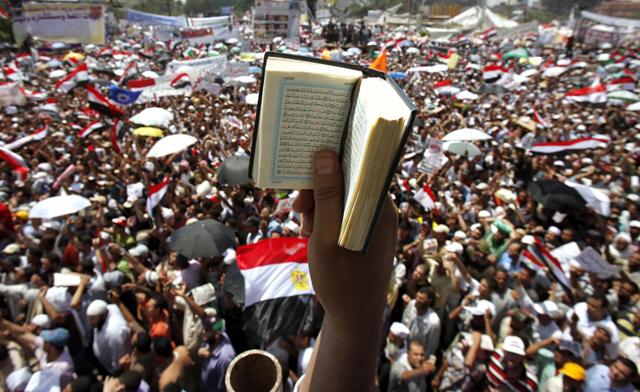
In retrospect, it’s almost a miracle that last week’s elections went forward as planned with massive turnout and relatively few irregularities, despite predictions of violence and calls for postponing elections after a week of lethal clashes in downtown Cairo and other parts of the country. While Egyptians are relieved that elections were conducted relatively fairly and peacefully, the sweeping victory of Islamists – whose candidates won a 61 percent majority in the first round – raises new concerns about the policies and ideological positions that will emerge from the next elected parliament.
Egyptians in 9 governorates went out en masse on November 28, not to protest, but rather to cast their votes in the first round of elections since ousting Hosni Mubarak in February. Although the first stage of voting went relatively smoothly, it’s important to recall the broader context of unrest and insecurity in which the electoral process is unfolding. The last 10 days before voting witnessed extreme violence. The army and police used excessive force (tear gas, rubber bullets and live rounds) against civilians protesting in Cairo’s Tahrir square and other governorates against the Supreme Council of the Armed Forces (SCAF) and a set of draft constitutional principles that would preserve and possibly enhance the military’s political and economic privileges in the future political system. The ensuing clashes between protesters and security forces resulted in over 40 deaths and more than 2,000 injured, according to the Ministry of Health. As a concession, the SCAF convened a series of emergency meetings with party leaders and presidential candidates and issued the long awaited anti-graft law, accepted the government’s resignation and announced a new timetable for a transfer of power to civilians by the end of June 2012. In addition, the SCAF urged all Egyptians to stand united, confirmed that elections would take place on time and extended the voting period by an extra day to encourage turnout and "avoid overcrowding and security issues."
The two-day polling process on November 28-29 went peacefully with minimal violence, although the process was marred by several irregularities and procedural violations, such as polling stations opening late, insufficient ballot papers and boxes, judges arriving late and party representatives campaigning inside polling centers in violation of a ban on campaigning 48 hours prior to the start of voting. These violations were widely documented by voters and NGOs observing the elections, although the High Electoral Commission has tried to downplay the impact of irregularities on the voting process, which saw a record turnout of 52 percent of the eligible voters.
First is regarding the sincerity of the Islamist parties to abiding by democratic principles. The FJP has said that its priorities are ending corruption, reviving the economy and establishing a true democracy in Egypt. Mohamed Badie, the Brotherhood’s Supreme Guide, said the party will work to build an inclusive government and prefers a semi-presidential system based on the French model. Badie also denied making any deals with SCAF. Such statements imply that the FJP will be looking to create a wider coalition in the Parliament and will try to distance itself from the hardline Nour Party. On the other hand, the Salafis have been advocating for stricter moral codes and restrictions on personal freedoms reminiscent of policies backed by Saudi Arabia’s Wahhabi establishment. They are among the newcomers to the game in Egyptian politics, and it is unclear exactly how they will play. Having once shunned democracy as inappropriately elevating man-made laws and institutions over Shari’a, Salafis are now choosing to participate in the formal political arena, and their parliamentarians could seek to enshrine conservative Islamist principles in new legislation.
Second, is the SCAF genuinely committed to transferring power to the parliament and a civilian president by end of June 2012? So far the ruling military council has been torn between the desire to preserve its political and economic privileges for as long as possible and the challenge of supervising a successful transition to democracy within a limited time frame. Under Article 56 of the Constitutional Declaration, the SCAF will hold the authority of the President and Parliament until elections are held. But on December 7, the SCAF issued a degree delegating presidential authority to newly appointed Prime Minister Kamal Ganzouri, while still retaining power over the armed forces and judiciary. Whether this decision signifies an actual loosening of the SCAF’s grip on power remains to be seen, and there are signs that the military is already maneuvering to curb the authority of the next parliament. in his most recent video interview, SCAF member Major General Mamdouh Shahin stated that the party winning the majority in the Parliament will not have the power to form the government. The statement was perceived as a power-grab by the Islamists, particularly the FJP, whose parliamentarians will likely demand the right to form a coalition government. Even before election results revealed an Islamist majority, the FJP’s head, Mohamed Morsi, stated on November 29 that the new parliament should be empowered to form a government representative of the political forces in the People’s Assembly, rather than a technocratic cabinet appointed by the prime minister. However, the generals’ appointment of Dr. Kamal al-Ganzouri as new Prime Minister confirms the speculation that the SCAF’s preferred scenario is for a technocratic government to hold power at least until the presidential election next summer. In addition, the inevitability of Islamist majority in parliament may make the SCAF even more reluctant to relinquish power, despite assurances that the military will respect the people’s choice.
Ahmed Morsy is a Ph.D. candidate at the School of International Relations, University of St. Andrews. He previously worked on political party development with the National Democratic Institute’s Cairo office and has also worked for the U.S. Embassy in Cairo.
Photo Credit: Al Arabiya
Image: 640x392_8076_159961.jpg
